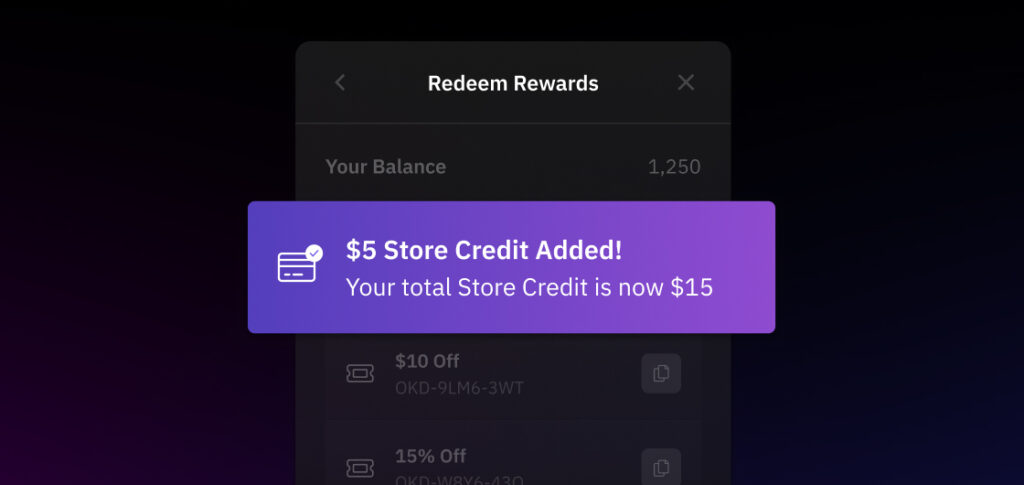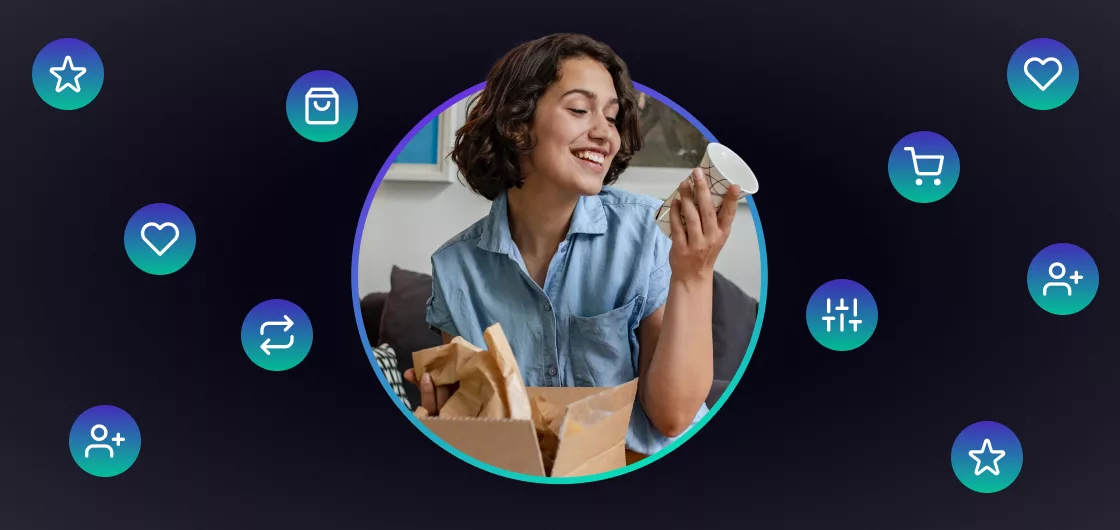
- Customer Loyalty
- Loyalty
- Product
Simplify reward redemption with Store Credit
Katie Vaught | Apr 22, 2025
Aug 22, 2023 | 4 minute read

Megan Wenzl
Content Marketing Manager
Customer loyalty matters. So much so that 43% of consumers have switched brands in the past six months because of a negative experience. That’s a lot of money companies willingly give their competitors simply because they don’t focus on building customer loyalty.
It also highlights why, in today’s competitive business landscape, building strong and lasting relationships with your shoppers is more important than ever. The reality is, customer loyalty is pivotal for the success and growth of every business, regardless of size or industry. Because of this, every business must strive to consistently meet or surpass their customers’ expectations. If you don’t, customers will stop purchasing from your brand and likely run into the arms of a competitor.
In this blog, we’ll explore the fundamental concepts behind customer loyalty and delve into why customer loyalty matters among your customer base.
Let’s get started.
Customer loyalty refers to the degree of commitment and attachment a customer feels towards your brand or product. Loyal customers are those that repeatedly engage with – and buy from – your brand over a competitor. They exhibit a preference for your brand, demonstrate trust, and often become brand advocates, actively promoting your business to others. This means they also tend to spend more, make repeat purchases, and are more likely to try new products or services offered by the brand.
Loyal customers also aren’t easily swayed by price fluctuations or promotions from competitors because their loyalty is rooted in the overall value and experience they receive from your brand. This means that when you have a strong community of loyal customers, the lifetime value of your customers is likely high. Something that’s crucial for the long-term success of your brand.
While the following benefits are great in ordinary times, the truth is that in this uncertain economic climate, the value of loyal customers is much higher. We know that during uncertain times, customers tend to be more cautious and price-sensitive, making it challenging for businesses to attract new customers solely based on competitive pricing. Our research on loyalty and retention found that 80% of consumers are currently cutting their spending to some degree, with 34% reporting that they are cutting it “significantly”.
However, loyal customers who have developed trust and confidence in a brand are more likely to remain loyal, both in good and uncertain economic times. Their continued support provides stability and a predictable revenue stream, mitigating the negative effects of economic fluctuations. Moreover, loyal customers can act as a buffer, providing valuable feedback and insights to help businesses adapt and navigate through challenging economic conditions. Therefore, prioritizing and measuring customer loyalty becomes a strategic advantage in maintaining business resilience and sustainability during economic volatility.
Brands that successfully cultivate customer loyalty enjoy a range of benefits. These benefits include:
Customer loyalty has a significant impact on customer lifetime value (CLTV), which refers to the total value a customer generates for a business throughout their relationship. Loyal customers tend to have higher CLTV as they continue to make repeat purchases over an extended period. They are less likely to switch to competitors, reducing customer acquisition costs and increasing the potential for upselling and cross-selling opportunities. By cultivating customer loyalty, businesses can maximize CLTV and enhance their overall revenue and profitability.
Similarly, by fostering customer loyalty, businesses can improve customer retention rates, reduce churn, and benefit from the long-term stability and profitability that come with a loyal customer base. Just a 5% increase in customer retention results in a profit increase of 25% to 95%. Not only do loyal customers spend more, though, but they’re more likely to respond to surveys, share zero-party data (ZPD), and participate in your referrals and/or loyalty programs.
Loyal customers act as brand advocates, spreading positive word-of-mouth and referrals. Their advocacy and recommendations can attract new customers at a lower cost compared to traditional marketing efforts. Additionally, loyal customers often require less marketing and promotional incentives to continue their patronage, reducing the overall customer acquisition expenses for the business. In fact, the cost of acquiring new customers is five times higher than the cost of retaining existing customers.
In a competitive marketplace, where consumers have numerous options, customer loyalty is a key differentiating factor. By fostering and nurturing loyal relationships, businesses can create a sustainable competitive advantage, increase customer retention, and ultimately drive long-term profitability and growth.
Okendo’s comprehensive, all-in-one customer marketing platform can help you build more productive and profitable relationships with your customers. To maximize customer loyalty, we’re incredibly excited to announce Okendo Loyalty to help you form stronger customer relationships to increase engagement and boost lifetime value.
Related articles
Ready to learn more?